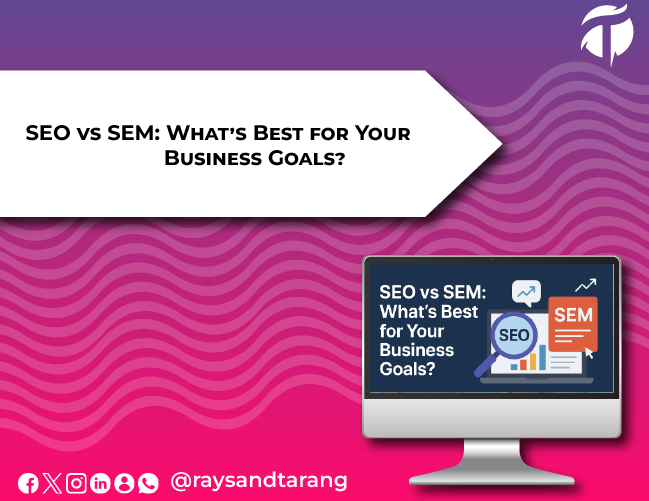Introduction
In the world of digital marketing, one question pops up more often than any other:
Should I go for SEO or SEM?
If you are a business owner, marketer, or entrepreneur trying to grow online — this decision can make or break your results. But don’t worry. In this blog, we will simplify everything so you can confidently choose the right path for your business goals.
What is SEO? (Search Engine Optimization)
SEO is the organic (unpaid) way to increase your website’s visibility in search engine results over time.
🔍 How SEO Works:
It involves improving your website structure, writing keyword-rich content, and gaining backlinks to rank higher on Google. The goal? More free, targeted traffic from search engines.
📈 Benefits of SEO:
- Long-term, sustainable results
- Builds credibility and trust
- Better ROI in the long run
- Ideal for businesses with a limited ad budget
What is SEM? (Search Engine Marketing)
SEM refers to paid advertising on search engines — often through Google Ads or Microsoft Ads.
🎯 How SEM Works:
You create an ad campaign targeting specific keywords. Your ad appears at the top of search results. You pay when someone clicks your ad — this is known as Pay-Per-Click (PPC).
🚀 Benefits of SEM:
- Instant visibility and traffic
- Precise targeting (location, device, time, etc.)
- Easy to measure ROI
- Great for promotions or quick campaigns
Key Differences Between SEO and SEM
| Feature | SEO | SEM |
| Traffic Type | Organic (Free) | Paid (Ad-based) |
| Time to Results | Takes 3–6 months | Immediate |
| Cost | Time-intensive, lower direct cost | Higher cost-per-click (CPC) |
| Visibility | Gradual, long-lasting | Instant, but temporary |
| Goal Fit | Long-term growth | Short-term gains or promotions |
When to Use SEO
✅ You want long-term brand visibility
✅ You’re focused on cost-effective lead generation
✅ Your niche is not highly competitive in ads
✅ You can wait for results (3–6 months)
When to Use SEM
✅ You need quick visibility
✅ You’re promoting a limited-time offer or event
✅ Your audience is ready to buy now
✅ You have a marketing budget to test and scale
Best Strategy: SEO, SEM or Both?
Honestly? It depends on your goals, budget, and timeline.
🔹 A new business might start with SEM to get quick traction
🔹 An established brand might focus on SEO for long-term success
🔹 Many successful businesses combine both for better reach
How to Choose What’s Right for You
Ask these simple questions:
- Do I need fast results or long-term growth?
- What is my monthly marketing budget?
- Am I targeting awareness, leads, or conversions?
- Can I afford to wait for SEO to take effect?
Your answers will point toward the right mix of SEO and SEM.
FAQs on SEO vs SEM
Q1. Is SEO better than SEM?
No — they serve different purposes. SEO is better for long-term visibility, while SEM is better for instant results. Ideally, use both as part of a full-funnel strategy.
Q2. How long does SEO take to show results?
Usually, 3 to 6 months — depending on your website quality, competition, and consistency of content and optimization efforts.
Q3. How much does SEM cost?
It varies based on your industry, keywords, and competition. You pay for each click — so you’ll need a smart budget and ad strategy to stay profitable.
Q4. Can I do both SEO and SEM together?
Yes! In fact, doing both can give your business a solid foundation (SEO) and quick wins (SEM) — especially during campaigns or product launches.
Q5. Can one agency manage both SEO and SEM?
Yes, if they have a full-stack team. Look for agencies that offer SEO, PPC, social media, branding, and analytics under one roof.
For example, RAYS and TARANG Technologies LLP is a trusted Digital Marketing company in Kashipur, Uttarakhand, serving across Chandigarh, Delhi, and Jaipur. They offer complete 360° services — from SEO, paid ads, social media strategy to ERP consultancy — helping brands grow both organically and via paid channels with strategic insights tailored to your goals.
Final Thoughts
There’s no “one-size-fits-all” answer to SEO vs SEM. It all depends on your goals. But once you understand the strengths of each — and how they can work together — you’ll be miles ahead in your digital journey.
Need help picking the right strategy?
📞 Let’s talk!

